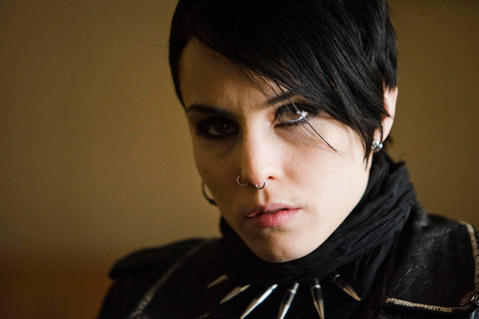 I was interested to read the recent discussion in the blogosphere over whether Lisbeth Sandler (spoilers ahead), heroine of The Girl with the Dragon Tattoo (and subsequent sequels The Girl Who Played with Fire and The Girl Who Kicked the Hornet's Nest) is a feminist figure. It's a question I contemplated while reading the books and watching the made-for-European-audiences film.
I was interested to read the recent discussion in the blogosphere over whether Lisbeth Sandler (spoilers ahead), heroine of The Girl with the Dragon Tattoo (and subsequent sequels The Girl Who Played with Fire and The Girl Who Kicked the Hornet's Nest) is a feminist figure. It's a question I contemplated while reading the books and watching the made-for-European-audiences film.Nina Shen Rastogi writes at Slate's Double X:
On one hand, she's a super-smart, takes-no-guff, possibly-Asperger's-having hacker: Awesome! Lisbeth felt like something fresh and different and cool when we first met her: A character who wasn't going to pander to our need to like her. But then, in the second half of Dragon Tattoo (spoiler alert), Larsson has her fall in love with the hero, Mikael Blomkvist, in a way that really irked me. My friend pointed out that Blomkvist comes across like a bad Mary Sue character—i.e., a wish-fulfilling stand-in for the author. (Larsson, before he died, was also a middle-aged, crusading journalist.) The novel portrays Blomkvist as having this mysterious sexual power over women without really giving us a reason to understand why; it just insists that this is the case. And there's nothing about Lisbeth that suggests she would be vulnerable to his inexplicable charms—she has utterly rejected every other kind of human attachment thus far—and yet, she succumbs! Hard! To me, that felt like bending a character unnaturally to fit the logic of the romantic suspense story, and it made me angry. And then, at the beginning of The Girl Who Played With Fire, when Lisbeth gets a boob job, I just threw up my hands.The primary way to think about The Girl with the ... series is to first remember that Sandler isn't the main character. Blomkvist is. The story is largely about a passionate (male) journalist that is, to use a word I don't really agree with, kind of a slut. As Shen Rastogi writes, the character of Blomkvist is eerily similar to the author's own biography.
Sandler is a somewhat complicated figure -- I, too, found the breast implants giving her a new sense of confidence odd -- but she is most definitely a strong female character, something often lacking in American media. And much as I'd like to see more feminist characters in popular culture, I don't have a litmus test and recognize that a less-than-perfect character makes for a more interesting one. Sandler is tough as nails but she's also extremely damaged. Is that feminist? It is and it isn't.
Finally what's important to understand about The Girl with the ... series is that the whole thing is uniquely Swedish. Sweden is, in itself, an oddity among Western countries. It comes with a litany of social (the right might even say socialist) policies -- what people seem upset about is that men aren't taking enough paternity leave. There has long been a strong feminist movement in Sweden; the country has the second-highest percentage of women in parliament. And though human trafficking is a key plot point in the series, it is often regarded as the country that has taken the most progressive and harm-reducing measures toward prostitution generally. Punishment toward johns is harsh while the sale of prostitution has been decriminalized. The books' attitudes toward marriage (which didn't really appear in the film as much), highlighting a very open marriage, was also very Swedish. In Sweden, marriage is viewed as a purely religious institution and most Swedes identify as not particularly religious. Marriage trends have been on the decline in the country. While Sandler may not be particularly feminist herself, she comes from a place with very feminist policies.
In other words, Sweden has a very, very different attitude toward gender politics than Americans do. It seems odd to me that we have feminists decrying such a Swedish book for not being feminist enough. I only wish that America produced the kind of literature that took human trafficking seriously, wrote strong (albeit damaged) female characters, and took more progressive views toward gender roles. And that is why I think an American version of the film will hurt my soul.

No comments:
Post a Comment